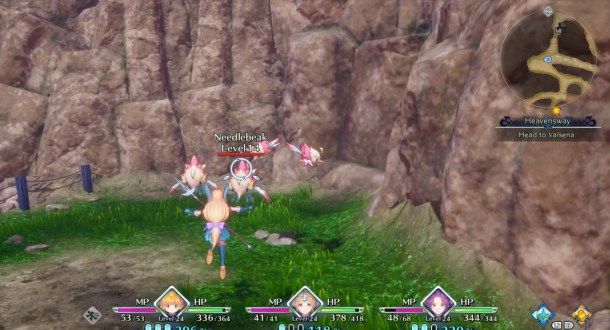
One of only two flaws I could possibly argue regarding gameplay, however, concerns the AI controlled characters. While you can control their actions to a degree by setting behavior and frequency of Spell, Class Strike, and item usage, they aren’t the most capable of protecting themselves. They can dodge roll, and are fairly good at it, yet when it comes to dodging that requires jumping, they fail miserably. They also tend to cast spells at inopportune times, like within an imminent enemy attack’s range, and so, you’ll need to keep constant eye on their HP during tougher battles or when enemies have multiple ranged attacks. The second flaw actually has little to do with gameplay mechanics, but rather the story-driven campaign. Much of the main plotlines overlap and although the distinct character points of view help bring diversity, it isn’t a cure, and so, some replay value is lost due to the straightforwardness of its plotlines. Despite these two minor flaws, with the strength of its mechanics, Trials of Mana’s overall gameplay is a genuine highlight.

Finally, I’ll discuss the aesthetics of Trials of Mana, the adaptation of which I am most satisfied with. Visually, the 2D original is perhaps the best example of that classic, epic Mana style. It pushed the SNES hardware and the result is arguably one of the best looking 16-bit efforts ever. Loads of detail from backgrounds to sprites, fantastic usage of color and contrast throughout, and imagination in spades, brought its world and its characters to life in an awe-inspiring way. Needless to say, the developers had quite the endeavor in adapting that 2D magnificence into 3D. As for the result, I do feel that this 3D visual adaptation, while not perfect, does manage to capture much of the same spirit of the original. I believe the visuals succeed in conveying the fact that this is still a fantasy game set in a vast dreamlike world full of magic and allure. I am also glad the visual direction is one slightly closer to realistic rather than the overly cartoonish style of the Secret of Mana remake, yet I still find this style a bit too simplistic. Especially the characters, I wish more realism were applied to their faces, as they convey so much additional emotion in those cutscenes. I will praise the character outfits, as I think each design pairs nicely with the associated Classes. I also like that every equipable weapon in the game has its own design; I definitely appreciate that level of detail and effort. Last, but not least, the bosses look fantastic. They are every bit as imaginative and ferocious as their 16-bit inspirations. As for the world itself, it remains true to its source, in that this is very much a grand environment to travel across, full of exotic, dangerous, and detailed locales. I praise the visual efforts for I feel the original’s influences shine through in the adaptation and possess that winsome Mana style.

As for the audio, one of its new features is the voice acting, and with it comes a few ups and downs. The English voice actors and their efforts are exactly what you would imagine from any video game dub released in the West. Meaning average at its best and inept at its worst. Unnatural pauses and inflections during monologues, explanations, and reactions, altogether hurt immersion. The voice actors themselves are uninspired and fail to add much, if anything, to their characters. Fortunately, the Japanese voice acting fairs better, as I found them to be more convincing to their characters’ personalities and more akin to how they would actually speak and react. Just having the Japanese voices as an option is appreciated too. One aspect of the overall addition of voice acting that I’m impressed with is the after-battle banter. While there is some repetition in what the characters say after a battle, I like how these sound bits of banter vary by location to better fit the on-screen events or the current set of tasks. Such a seemingly simple addition, they’re nonetheless remarkable because I would never have realized how much more immersion they could add.
As for Trials of Mana’s musical adaptation, I am pleased that the developers decided to take a more orchestral sounding approach to the original soundtrack, for the results are absolutely amazing. Each track manages to preserve the greatness of their original counterpart and is only enhanced by the rearrangement. And since every piece of music had already fit its location, situation, and event perfectly, the overall effect is now raised even higher. Listening to this remade soundtrack while experiencing this game in its remade form is a true pleasure. This is the effort I had hoped for, for the original score is arguably as masterful as Secret of Mana’s original soundtrack. Just the fact that the tones and moods of the original score are preserved here is praiseworthy; to have them further heightened by the rearrangement, under the guidance of the original’s composer, Hiroki Kikuta, is a true gift. I enjoyed falling in love with this sound score all over again.

Trials of Mana is a satisfyingly impressive remake, honoring the original SNES classic while also possessing its own brilliance. The addition of cutscenes adds depth to the narrative, the updates to gameplay only help the already noteworthy experience, and the rearranged soundtrack is respectfully magnificent. The voice acting and visuals have their missteps, while having their strengths as well, and the flaws of the original’s narrative remain present, yet Trials of Mana, as a whole, is most definitely a fun and satisfying experience. And so, whether you’re a newcomer or a veteran of the Mana series, Trials of Mana will assuredly captivate and please.
| Review Score | |
|---|---|
| Overall | |
*Images featured have been reduced in quality
**Review copy purchased by reviewer





